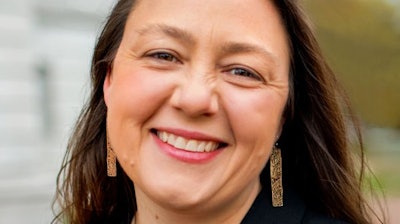 Dr. Alecia Sundsmo
Dr. Alecia Sundsmo
Over the last 15 years, she’s operated as a wellness professional and leader for various higher education institutions, most recently serving as the director of Counseling and Psychological Services (CAPS) at Cornell University.
Before Cornell, Sundsmo was clinical director of mental health services at the University of Wisconsin-Madison, counseling center director and wellness center executive director at Dickinson College, and college services director for Grinnell College through Poweshiek County’s Mental Health Center.
Now, she’s been given the chance to improve student mental health from another side, where companies partner with schools to bolster their counseling services. Since July 2022, Sundsmo has been serving as executive director of therapy at telehealth company Mantra Health.
Mantra collaborates with higher ed institutions to provide mental health services to students.
In her new role, Sundsmo sees the possibility of aiding students on a bigger scale.
"I actually worked with Mantra when I was at Cornell, and so had a chance to get to know the company from the client's side,” Sundsmo says. “And now that I'm on this side, one of the things that really excites me about working here at Mantra is it's clear that they are trying to get this right as they're building their services, trying to connect in and meet the needs of our college students when our on-the-ground services hit their gaps.”
“So, I think what really has excited me about taking on this job and getting on this side of things is being able to have influence and supporting students across the country rather than solely on the campus I might be directing services for. I now have the ability to help support students across the nation.”
Sundsmo plans on sharing the knowledge and familiarity of higher ed that she’s accumulated over her career to better prepare providers, she said.
“I've spent my career in higher education but that's not been the background of all of our providers,” says Sundsmo.
Sundsmo says she uses her knowledge from the field to help give providers a window into what the experience on the ground looks like in college mental health today. She helps providers better adapt to each of the different models of college counseling.
“Provider training is definitely a big piece of what I'll continue to do,” she says. “And I hope to be able to expand that to our partner schools as well, through webinars."
Sundsmo holds a bachelor’s degree in psychology from The University of the South and both a master’s and a doctorate in clinical psychology from Pacific University in Oregon.
College students’ need for mental health resources is real, Sundsmo says. The needs vary and there should be resources for the variations, she says.
“I think there's been a myth in this age where people feel like we're over-professionalizing normal development,” Sundsmo says. “And while that might be true for a minority of students, I think that what we have done is actually create a system where we are finally seeing the true nature of what mental illness looks like come to bear and we need to be able to provide access to the care. It doesn't mean that schools have to fund the totality of that access, but I think what we do need to do a better job of in higher education is making sure that we have pathways for all of our students to get the mental healthcare that they need.
“That means providing them with education when they have the equivalent of like the mental health ‘cold,’” she continues. “There's a certain amount of self-care related to mental health that they can do. There are times when you need that mid-range of treatment. And there are times that you need more of that intensive treatment. ... I do think we have a responsibility to help students get educated about how to access that care and make sure that there's a pathway. When we call them to our campuses, we've got to meet those needs."
Sundsmo says she wanted to “flip the question” of meeting student mental health needs, prioritizing what the needs are and then trying to find creative funding solutions instead of attempting to meet demand with a pre-determined budget.
“I do think our college students deserve that,” Sundsmo says. “And especially given that suicide is the second leading cause of death in this population, it is something that I feel really passionate about and think we owe it to our students to solve."















